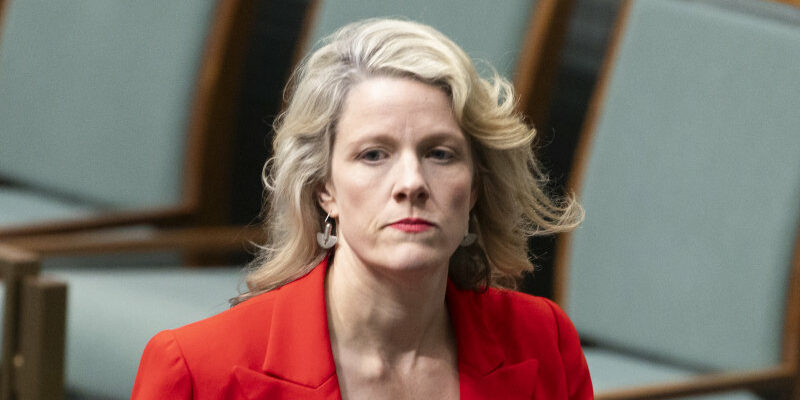Save articles for later
Add articles to your saved list and come back to them any time.
Former immigration detainees who served little or no jail time may be caught up in the federal government’s plan to throw sexual and violent offenders back behind bars, with legislation expected to capture most of the people released following the High Court’s ruling last month.
A preventative detention bill to be put before parliament on Wednesday will enable the government to ask a court to put a former detainee in prison for up to three years if they have been convicted of a violent or sexual crime attracting a maximum sentence of at least seven years.
Home Affairs Minister Clare O’Neil has promised a tough new preventative detention regime.Credit: Alex Ellinghausen
Former NSW director of public prosecutions, Nick Cowdery, KC, said apart from a few exceptions, there were no mandatory minimum sentences for crimes in that state involving violent offending and sexual assault.
Legal experts said this meant there was potential for individuals who had actually spent a much shorter period in jail, or none at all, to be captured by the legislation.
A state or territory’s Supreme Court judge must be satisfied that person has a high probability of committing another offence, based on information provided to Immigration Minister Andrew Giles by Australian Border Force and Australian Federal Police, and an expert’s report.
The amendments will be attached to an existing bill addressing the High Court’s outlawing of indefinite detention, as Labor and the Coalition go toe-to-toe on immigration and border security following the release of at least 145 former detainees.
A datasheet released by Home Affairs last month, when about 93 detainees had been released, showed 56 of them had committed violent or sexual offences.
Speaking in Sydney, Opposition Leader Peter Dutton called for Giles and Home Affairs Minister Clare O’Neil to be sacked over their handling of the fallout, while saying the legislation needed to be constitutionally watertight to avoid another High Court challenge.
“We need to make sure that the government has given it proper consideration because if not, they’ll then be back up in the High Court,” he said.
The government is not expected to release its legal advice concerning the legislation.
A government spokesperson said on Sunday the legislation was closely modelled on the Coalition’s High Risk Terrorist Offender scheme.
“If the Coalition thought this model was appropriate to deal with terrorist threats to our country, they must support this model for serious violent and sexual offenders, and work with the government to get this bill through the parliament urgently,” the spokesperson said.
O’Neil has repeatedly said if it were up to her, none of the detainees would have been released.
The bill also captures people who have been convicted of the same kind of offences overseas.
One of the released detainees is Sirul Azhar Umar, a Malaysian hitman who fled to Australia shortly before he was sentenced to death for the murder of a model in his home country in 2015.
The proposed laws would create both a community safety detention order and a community safety supervision order, giving the court the ability to detain someone for three years at a time if found to pose a sufficient risk to the community. Their incarceration must be reviewed every year.
Alternatively, a person could be placed under supervision if the court found on the balance of probabilities there was an unacceptable risk of them committing a serious violent or sexual offence.
Breaching a supervision order would incur jail time of at least one year and up to five years.
Australia’s former watchdog for national security laws, Grant Donaldson, SC, savaged the Albanese government and opposition over their plans, accusing them of whipping up fear and pursuing an unworkable regime.
“I think it’s a disgrace and shames both sides,” Donaldson, who was the solicitor-general for Western Australia from 2012 to 2016, said.
Cut through the noise of federal politics with news, views and expert analysis. Subscribers can sign up to our weekly Inside Politics newsletter.
Most Viewed in Politics
From our partners
Source: Read Full Article

